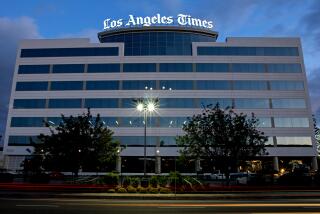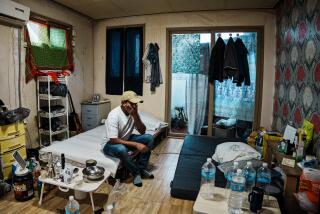South Korea’s squeeze on financial news
In South Korea, image and perception are paramount -- especially when it comes to how the conservative Lee Myung-bak administration is dealing with the global financial crisis.
In an apparent effort to restore confidence among international investors, officials here are waging a not-so-subtle propaganda campaign against foreign journalists and economic experts who publish articles or reports that are contrary to authorities’ view of events.
Offenders are lectured, blacklisted and sometimes threatened with legal action by officials who use domestic newspapers to decry “Korea-bashing” reports by the foreign news media.
Last month, Finance Minister Yoon Jeung-hyun said at a gathering of officials that they must “monitor and correct misinformed reports” by foreign journalists who chronicle the nation’s attempts to stem its frustrating financial slide, according to local news reports.
Yet just days after Yoon called for better communication with the journalists, his office declined an interview with The Times about the Lee administration’s tactics when dealing with what it views as inaccurate or biased reporting.
“I regret to inform you that senior ranking officials would rather not accept your interview request,” read an e-mail from the agency’s public affairs office.
Several market analysts here say they have come under pressure from officials not to make negative comments on the government’s efforts to revive the economy.
“The government takes any bad news as an attack on their system,” said one analyst, who asked not to be named because of the sensitivity of the situation. “It sets off alarms. And then they wage a counterattack.”
In mid-March, the head of the South Korean bank association threatened to sue Fitch Ratings, a New York- and London-based firm, charging that a “stress test” that said Korean banks could lose more than $30 billion by the end of 2010 was based on flawed assumptions.
Government officials complain that many foreign reporters too often resort to hyperbole, suggesting that the Korean economy will soon suffer a meltdown and exaggerating South Korea’s short-term debt, thus inflating investor fears.
Many of the journalists draw parallels with the 1997 Asian financial crisis, which officials say is like comparing apples with oranges.
The result, some observers say, is that officials have cut off communication on sensitive issues with most foreign journalists.
“I can see how they get worried about it -- they have quite a few legitimate concerns,” said Christian Oliver, a Seoul-based correspondent for the Financial Times. “Many journalists seem to always write the economy story with echoes of the last financial crisis. It’s very dramatic, apocalyptic, end-of-the-world kind of reporting.”
But Oliver said the government often goes “after the wrong people.”
“There is the idea that ‘the lady doth protest too much.’ It almost raises more questions -- the amount they protest.”
Analysts say the South Korean government is convinced that any negative press will hurt its international status.
“Koreans are extraordinarily sensitive to issues of hierarchy and international ranking,” said David Kang, director of the Korean Studies Institute at USC. “There’s this mentality that: ‘We’re better than we’re being ranked. This is a reflection of how other countries view us. They don’t respect us enough.’ ”
When it comes to the worldwide economic crisis, he said, Koreans don’t want to be blamed for something they didn’t start. And journalists bear the brunt of government frustration.
“Foreign reporters have always had a difficult relationship with the Korean government,” he said. “It’s either a cozy backroom relationship or extremely confrontational.”
In a recent column for the Korea Times, former journalist and author Michael Breen challenged South Korean officials to pose as foreign reporters to see firsthand how officials dodge them and then complain about what they write.
He also criticized officials for accusing the Financial Times and the Times of London of making negative predictions about the Korean economy last year out of hurt national pride after British bank HSBC was thwarted in its bid to buy Korea Exchange Bank.
“British bank, British media. Get it?” Breen wrote. “Memo to Korea: Reporters only support their country in times of war, and not always then. . . . In short, the HSBC story is just another story for British reporters.”
But President Lee has his own strategy for managing the press. He has begun to give one-on-one interviews with newspapers such as the Financial Times. And he recently wrote an opinion piece in the Wall Street Journal headlined “How Korea Solved its Banking Crisis.”
More to Read
Start your day right
Sign up for Essential California for news, features and recommendations from the L.A. Times and beyond in your inbox six days a week.
You may occasionally receive promotional content from the Los Angeles Times.







